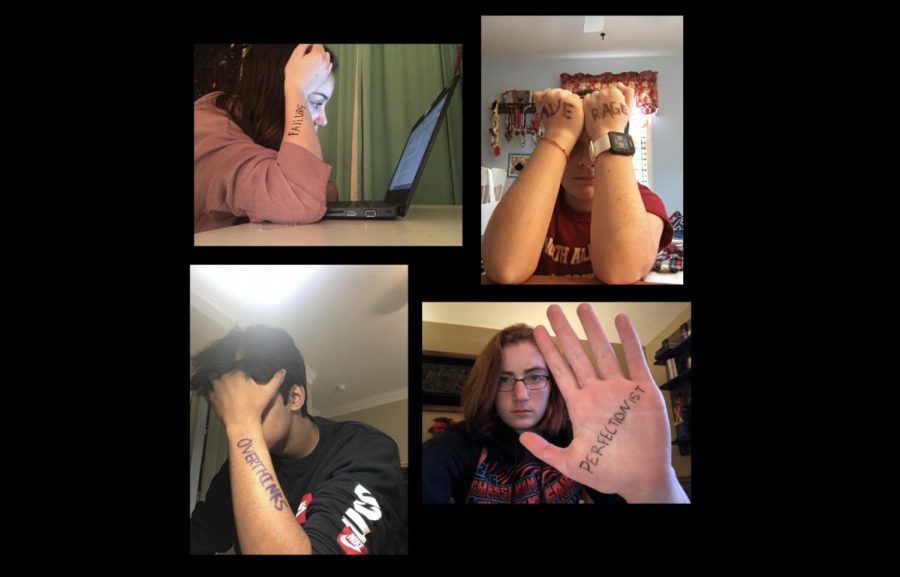Corrupt Competition Culture #2: Shelf Life
An extended metaphor comparing everything a student works for to labels on a grocery store shelf.
Jess Daninhirsch, Claire Majerac, Samantha Podnar, Alok Shah
Student stress and anxieties aren’t always visible, but they are always there.
Companies spend a great deal of time and money on packaging for their products. An eye-catching design can get consumers to spend their limited budget on a mediocre product, yet people won’t know if they’ve been the victims of flashy advertising until they open the box. Students do the exact same thing, but we aren’t lined up on grocery stores shelves trying to catch the eyes of hungry consumers. Colleges have a limited number of admission spots, and we struggle to convince them to spend one on us.
We boast our impressiveness with every 4.0 and “A,” like stickers on a product that say “FDA approved.” We work tirelessly to worship an application that claims to be not only a summary of the last four years of our lives, but a complete representation of who we are as people.
We work tirelessly to worship an application that claims to be not only a summary of the last four years of our lives, but a complete representation of who we are as people.
Hours upon hours of volunteering, connections, and experiences are summed up in seven letters: Key Club. “Gluten free.” Hundreds of practice problems boil down to a 1520. “Low Fat.” “100% natural.” Admission into a prestigious summer program. “Non GMO.” “Premium ingredients.” “Great deal.” When it comes to college applications, we have all become salesmen.
We, too, recognize this endless game, the slaving away at things we have no passion for, just for the chance of catching a college admissions officer’s eye. It has turned us into cynics, recognizing the scope of our situation yet powerless to do anything but compete. If someone starts a club, we say it’s just a grab for college. Someone who studies all the time is a “try-hard,” but we still covet an “A” on our transcript. Passion, if it ever makes an appearance, is quickly monetized, except the currency is internships and awards.
We study ourselves to sleep, turn against each other, and resort to drastic measures to achieve that coveted acceptance letter. We resort to a “Sanity Bank” of sorts, where we invest our mental health into taking 3, 4, 5, 6 AP classes, hoping that we receive a positive return on investment. An uptick on the stock that we have become. In essence, we become mental bulimics, endlessly and uncontrollably attempting to stuff knowledge down our throats the day before testing, just to purge it the second we put down our pencils.
Would cheating really be a problem if there was not such an emphasis placed on test scores, GPA, or class rank? Would we be kinder and more supportive of our peers if we didn’t have to fear that they might take our spot at a top university? Unfortunately, we may never know. The status quo seems to reward the best of the best, but what is it really measuring? Moreover, at what cost? Is the product design of a package really indicative of what’s inside, or have we just learned to cater to what colleges want to see?
Is the product design of a package really indicative of what’s inside, or have we just learned to cater to what colleges want to see?
There is an entire industry built on the crafting of a perfect application, on the art of package design. Private tutors, counselors, test prep instructors. Photoshop experts, document forgers, and stand-in test takers, if previous methods don’t prove to be effective enough. Any student can be transformed into the ideal candidate if enough time and money are invested in them. The line between what is fair and what is not gets blurred. Cheating is wrong, but what about counselors who guide a student to create the perfect application?
Some students have private instructors and access to expensive test prep services; others work a job on the side and may be the first in their family to attend college. Some companies have entire marketing teams led by experts; others just have a few people working out of a garage. Even The College Board itself makes hundreds of millions of dollars from our desperation. AP Test Fees are upwards of ninety dollars. Furthermore, when it comes to both the SAT and ACT, people pay astronomical amounts of money just for a number that tells them their worth in society. Is this even ethical? What is the real price of success?
When we are treated as products, it is difficult to see our own value as human beings.
Millions of dollars are spent every year to keep us playing this game. Colleges pump out commercials and brochures that paint themselves as the solution, as the bright future sitting at the top of the hill. A kind word from a school counselor about how college is not a necessary path to success is nothing compared to what we’ve been shown our entire lives. Encouraging teachers say grades do not define us, yet we lose sleep and happiness over a perfect transcript because it will give us the best shot at admission into our dream school. Many of us dream of getting our acceptance letters. Once we read a “Congratulations, we are pleased to offer you admission to…”, everything will be okay. Our future is secured. We let out a breath that we have been holding for the past four years. We are free, free of the uncertainty and stress that shackles us every waking moment of high school.
But the other side of that is failure. We work because we are afraid. Anything less than a 4.0 is embarrassing. A “B” on our transcript is unbearable. If she can get a 36, why can’t I? Feelings of inadequacy, of the fear of defeat, chase us for four years. Maybe the successful ones, the ones getting acceptances from Harvard and MIT and Yale are those who were just willing to suffer the most. They worked and worked and worked, and it was worth it. At least that’s what we try to convince ourselves. In the meantime, we have to put in the effort, bear the mental and physical toll, wrap ourselves up in pretty packaging and pray that any school decides to take us off the shelf.
In the meantime, we have to put in the effort, bear the mental and physical toll, wrap ourselves up in pretty packaging and pray that any school decides to take us off the shelf.
Time is a valuable commodity, so why are we spending hours doing SAT prep? Why are we chasing a future of success and happiness at the expense of our happiness now, losing ourselves in the meantime? Why are we cramming knowledge into our heads for the “A” and not for the joy of learning? When will people realize that we don’t know what we’re doing, that we’re just reaching for whatever it takes to get an acceptance letter? When will colleges get sick of the same essays about struggles and triumphs, life changing moments for us but cliches by the time we get the chance to tell our story? When we are treated as products, it is difficult to see our own value as human beings. It feels like our expiration date is drawing ever closer. Our shelf life is about to run out due to this inherently Corrupt Competition Culture.
Sam Podnar is a sophomore at NAI and has recently become interested in writing for NAEye. Two of her passions, baking and eating, complement each other...








